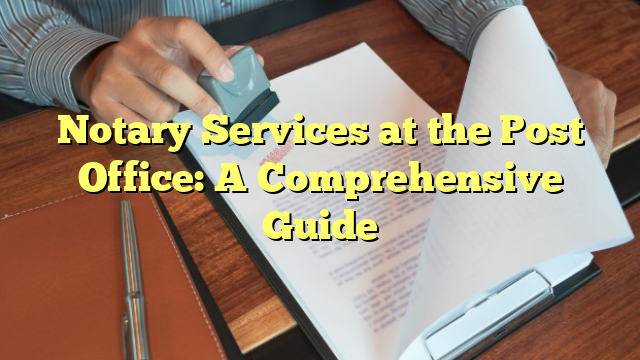When it comes to notarizing important documents, accessibility and convenience are crucial factors to consider. Many individuals wonder if their local post office provides notary services. This article aims to explore whether the post office offers notary services, the benefits of utilizing their services, the process of finding a notary at the post office, and alternative options for notarization if the post office does not offer this service.
-
Understanding the Role of Notaries and Notarial Services:
Before delving into the specifics of notary services at the post office, it is important to understand the role of notaries and the services they provide. This section provides an overview of the responsibilities and duties of notaries, explaining their legal authority, the types of documents they can notarize, and the significance of their role in ensuring the authenticity and validity of legal transactions.
-
The Convenience of Notary Services at the Post Office:
Notarization services at the post office offer several advantages. This section explores the benefits of accessing notarial services at the post office. It highlights the convenience of having a notary available at a trusted and widely accessible location during post office hours, as well as the potential cost savings compared to private notaries or law offices.
-
The Availability of Notary Services at the Post Office:
To determine if the post office provides notary services, it is important to examine their official policies and practices. This section explores the availability of notary services at the post office. It discusses whether notary services are offered at all post office locations or only at select branches, and any specific requirements or limitations associated with the service.
-
Identifying a Notary at the Post Office:
For individuals seeking notary services at the post office, it is crucial to know how to find a notary within the facility. This section provides information on the process of identifying a notary at the post office. It discusses various methods, such as inquiring with post office staff, checking online resources, or contacting the local post office directly to inquire about notary availability.
-
Notary Fees and Associated Costs:
Notary fees can vary depending on the service provider. This section addresses the question of whether the post office charges for notarial services and provides an overview of the associated costs. It explores any fee structures, potential discounts for specific customers, and the transparency of fee disclosure at the post office.
-
Document Preparation and Requirements:
Proper document preparation and meeting specific requirements are essential for a smooth notarial process. This section discusses the importance of document preparation before visiting a notary at the post office. It highlights the need for valid identification, ensuring the documents are complete, and any additional requirements specific to notarial services at the post office.
-
Alternative Options for Notarization:
If the post office does not offer notarial services or if it is not convenient for the individual, alternative options are available. This section explores alternative methods for accessing notarial services, such as online notary platforms, mobile notaries, other government offices, or local notary offices. It discusses the advantages and limitations of these alternatives, helping individuals choose the most suitable option.
-
Digital Solutions and Online Notarization:
With advancements in technology, online notarization has gained popularity. This section explores the concept of online notarization, discussing its benefits, security measures, and the potential availability of such services through the post office or other platforms. It also addresses the legality and acceptance of digitally notarized documents in different jurisdictions.
-
Legal Compliance and Quality Assurance:
When seeking notarial services, it is important to ensure compliance with legal requirements and maintain the quality and integrity of the notarized documents. This section emphasizes the importance of working with qualified and licensed notaries, whether through the post office or alternative options. It provides guidance on verifying the credentials of notaries and the significance of adhering to local regulations.
Conclusion:
While the post office is a trusted and accessible institution, notary services may not be universally available at all post office locations. However, for individuals seeking convenient and reliable notarization options, exploring the possibility of finding a notary at the post office can be beneficial. If the post office does not offer notarial services or if it is not convenient for the individual, alternative methods, such as online platforms, mobile notaries, government offices, or local notary offices, can be explored. The key is to find a qualified and licensed notary to ensure the proper validation of important legal documents
